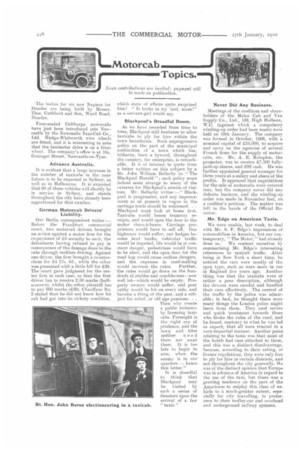Motorcab Topics.
Page 14

If you've noticed an error in this article please click here to report it so we can fix it.
The bodies for six new Napiers for Dundee are being built by Messrs. Thos. Cuthbert and Son, Ward Road, Dundee.
Four-seated Calthorpe motorca.bs have just been introduced into Newcastle by the Newcastle Taxi-Cab Co., Ltd. Rudge-Whitworth wire wheels are fitted, and it is interesting to note that the taximeter drive is on a front wheel. The company's office is at 16a, Grainger Street, Neweastle-on-Tyne.
Advance Australia.
It is evident that a large increase in the number of taxicabs in the near future is to be expected in Sydney, as well as in Melbourne. It is expected that 60 of these vehicles will shortly be in service in Sydney, and stands throughout the city have already been apportioned for that number.
German Motorcab Drivers' Liability.
Our Berlin correspondent writes:— Before the Frankfort commercial court, two motoreab drivers brought an action against a motor firm for the
re-payment of security to each, the defendants having refused to pay in consequence of the damage done to the tabs through reckless driving. Agaimst one driver, the firm brought a counterclaim for .C4 17s. 6d., while the other was presented with a little bill for £38. The court gave judgment for the motor firm in each case, so that the first driver has to receive 2.30 marks (halfa-crown), whilst the other plaintiff has to pay 660 marks (V33). Chauffeur No. 2 stated that he did not know how his cab had got into its rickety condition, which state of affairs quite surprised him! " It broke in my 'and, mum?" as a servant-girl would say.
Blackpool's Dreadful Doom.
As we have recorded from time to time, Blackpool still hesitates to allow taxicabs to ply for hire within the town boundaries. Such unprogressive policy on the part of the municipal authorities of a town which has, hitherto, been a byword, throughout the country, for enterprise, is remarkable. It is of interest to quote from a letter written on this subject by a Mr. John William l3ellarby to " The Blackpool Herald " ; such policy must indeed seem strange to many of the caterers for Blackpool's armies of visitors. Mr. Bellarby writes Blackpool is progressive, and any improvement as at present in vogue in the carriage trade should be welcomed. . Blackpool must look at home first. Taxicabs would lessen tramway receipts, and would open the door to the motor chars-it-banes. Carriage proprietors would have to sell off. Our highways would suffer, our hedges become mml banks, vehicular traffic would be impeded, life would be in con.stant danger, pedestrians would have to be alert., arid the open door for the road hog would cause endless dangers, and the expenses in road-making
would increase the rates. Further, the. rates would go down on the hundreds of stables and coachbouses—now well let—which would be empty. Property owners would suffer, and poor cabby would be hit on every side, and become a thing of the past, and a subject for relief, or old age pensions. . .
Then why create a public nuisance by licensing taxicabs. Foresight is the right eye of prudence, and the town and time neither need them nor want them. It is too late to begin to arm, when the enemy is in our quarters — hence this letter."
It is dreadful to think that Blackpool may be visited by such a series of disasters upon the arrival of a few " taxis." Never Did Any Business.
Meetings of the creditors and shareholders of the Motor Cab and Van Supply Co., Ltd., 13.3, High Holborn, W.C. (against which a compulsory winding-up order had been made) were held on 10th January. The company was formed in October, 1908, with a nominal capital of e10,000, to acquire and carry on the agencies of several French firms for the supply of motorcabs, etc. Mr. A. E. Kemplen, the promoter, was to receive £7,506 fullypaid-up shares, and :E82 cash. He was further appointed general manager for three years at a salary and share of the profits. It appeared that negotiations for the sale of motorcabs were entered into, but the company never did any definite business, and the winding-up order was made in November last, on a creditor's petition. The matter was left in the hands of the Official Receiver.
Mr. Edge on American Taxis.
We were unable, last week, to deal with Mr. S. F. Edge's impressions of automobilism in America, but our contemporary, " The Motor," had already done so. We content ourselves by summarizing Mr. Edge's interesting references to taxicab traffic. After being in New York a short time, he noticed the cars were mostly of the open type, such as were more in use in England live years ago. Another thing was that the taxicabs were of rather a poor description, although the drivers were careful and handled their cars effectively. The control of the traffic by the police was admirable; in fact, he thought there were many things the London police might learn from them. They used severe and quick treatment. towards those who broke the rules of the road, and he found, contrary to what he was led to expect, that all were treated in a very-impartial manner. Another point relating to the taxis was that most of the hotels had cars attached to them, and this was a distinct disadvantage, because, according to their rating, or licence regulations, they were only free to ply for hire in certain districts, and not throughout the city generally. He was of the distinct opinion that Europe was in advance of America in regard to the use of the taxi, but there was a growing tendency on the part of the Americans to employ this class of vehicle to amuch-greater extent, especially for city travelling, in preference to their trolley-car and overhead and underground rai!wity systems.




















